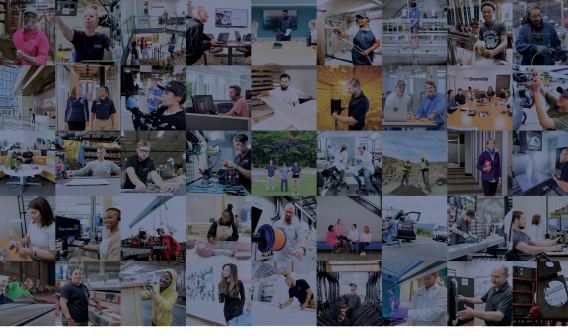So, I sought a foundation competition in 1998 called the Stern Family Public Interest Pioneer Award, a national competition. I won that in ‘98 and that’s how I started Good Jobs First.
Moret: You proposed it as a concept in a grant competition?
LeRoy: I did. I said there’s this war among the states, there’s a lot of poorly regulated money out there, there’s a lot of people who see ways to fix things. We’ve got the embryonic positive movement on these reforms I’ve documented, but we need kind of a laser-focused watchdog player to do that, and that’s what we try to be at Good Jobs First. We’ll be 21 this year.
Moret: I don’t know that I actually ever knew that, but I just in my gut felt like you had to have been the founder.
LeRoy: I’m the only one crazy enough.
Moret: As you know, we’ve talked about if we really are trying to make sure that companies are doing what they’ve promised to do, how do we actually measure job creation and payroll, dealing with all that technical stuff. So we’re really grateful for what you guys have done.
When people think about Good Jobs First in the economic development community, I think the perception is there that Good Jobs First is sort of against all economic development incentives, but I think your perspective is actually a little more nuanced than that.
LeRoy: Yeah. Thanks for asking. And we’ve never been against incentives, per se. We’re not libertarians in that respect, although we like the fact that some libertarian groups have weighed in on these issues in very principled ways. I think there’s really a kind of left/right common ground on a lot of reforms, especially around transparency.
To us, transparency is the cornerstone of everything else, no matter where you’re coming from.
Moret: In the absence of a unilateral disarmament by communities and states, what do you think are some of the most important public policy decisions that public officials can make around incentives?
LeRoy: Yeah, great question, and I’m actually preparing a memo. We’ve had so many questions about what’s to be done, especially in the wake of the Amazon HQ2 competition.
When companies are comparing places they run the costs as well as the benefits, and on the cost side 98 percent of the costs of a typical company aren’t state and local taxes, and therefore those big cost variables almost always derive where companies choose to expand or locate.
If public officials would focus 98 percent of their energy on great infrastructure, a great skills base, thinking strategically about clusters and linkages and other things that benefit lots of employers rather than the 2 percent, which is to say shaving off some fraction of 2 percent with incentive deals, they’ll come out ahead in the long run, because that’s where the real action is.
Moret: As I think you’re aware, previous work by Good Jobs First as well as conversations you and I had early on and later on had a meaningful influence on Virginia’s approach toward the Amazon HQ2 project, but we didn’t actually share our proposal with you prior to the company’s announcement.
I’d be curious now that you’ve had a chance reflect on it, what do you think about Virginia’s approach with Amazon sort of compared to other states, as well as the big focus we placed on tech talent development?
LeRoy: You know, it’s obvious that Virginia spent far less than New York and much less than Maryland had offered and much less now that we know what Pennsylvania had offered, which was $9.7 billion for the Pittsburgh bid.
In that respect it’s good. I tip my hat to the state in that respect for not spending in the stratosphere the way those other bids had. Without knowing your thinking, debriefing now for the first time after the news comes out, I assume you knew that you had a strong hand.
I’ve also been asked by lots of journalists why there was such a difference in the spending of the deals, and I make the point that New York had historically always been a big mega deal state. Depending on how you sliced the data, by money or deals, New York and Michigan have always been the biggest spenders in this space for really nine-and-ten-figure deals.
Moret: Our offer was I think less about feeling like we had a strong hand and probably more about being consistent with Virginia’s tradition of being conservative about these things.
We really saw this as an opportunity to work on that broader set of issues that you talked about, with a big focus on tech talent, and ultimately roughly $1 billion we expect to add to our public education institutions to double the production of computer science and related degrees, and we think that made a difference. But it certainly is going to make a difference for our whole tech sector. We’ll never know exactly what Amazon weighted the most.
What do you think America, broadly speaking, and economic development practitioners can learn from the Amazon HQ2 process?
LeRoy: A couple of things. Pulling back sort of 5,000 feet, I think one of the big teachable takeaways for the general public was oh, my God, what’s this system about? I was surprised at how many even semi-experienced business journalists I had to educate about the way site location searches typically work, and it reflects the fact that this was, I think, only the sixth public auction in U.S. history, right? Three by Boeing, Tesla, and long ago Saturn and General Motors back in the ’80s.
The fact that these auctions are conducted secretly almost always means that it’s just an incredibly poorly understood aspect of the economy and government practice. I think that now a lot more people understand how this works, and we’ve certainly taken advantage of it for that purpose, to try to explain the history of Fantus and the site location consulting industry and the 80-year backstory about the way the system has evolved and how typically it’s so secretive.
I think there’s going to be a lot more pressure now for the kinds of remedies we’ve been pushing all along, which is to say let’s have caps for subsidies. You may also notice that the whole issue of having formal agreements between neighboring states not to pirate each other is, I think, about to get completely rekindled.
Moret: That makes sense. We’re definitely going to be continuing to follow Good Jobs First closely, and I think our site consultant friends and corporate executives are going to find it interesting that we’re featuring you guys in our first issue, which we’re proud about.
For the full interview, visit www.vedp.org/Podcasts





